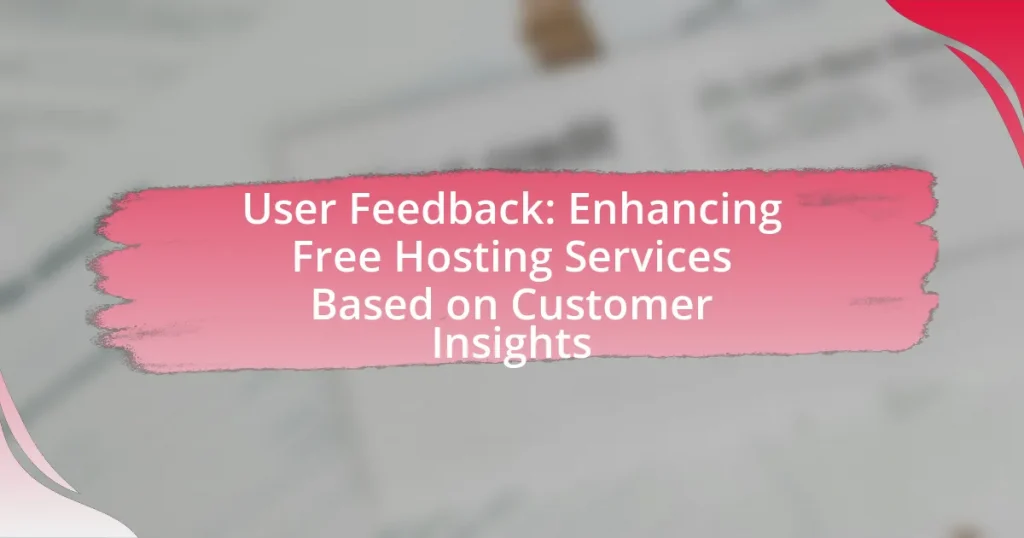The article examines case studies of successful websites built on free hosting platforms, highlighting notable examples such as WordPress.com, Wix, and GitHub Pages. It discusses how these platforms enable users to create professional websites without upfront costs, showcasing the potential for significant traffic and engagement. Key criteria for success include user engagement, functionality, and design, while challenges such as limited resources and technical issues are also addressed. Strategies for overcoming these challenges and optimizing website performance are outlined, along with lessons learned that aspiring website creators can apply to their projects.

What are Case Studies of Successful Websites Built on Free Hosting?
Successful websites built on free hosting include platforms like WordPress.com, Wix, and GitHub Pages. WordPress.com hosts millions of blogs and small business sites, demonstrating that users can create professional-looking websites without upfront costs. Wix allows users to build visually appealing websites with drag-and-drop features, attracting a diverse range of users from artists to entrepreneurs. GitHub Pages enables developers to showcase their projects and portfolios, highlighting the effectiveness of free hosting for tech-related content. These examples illustrate that free hosting can support a variety of successful online ventures, providing essential tools and resources for users to establish their presence on the web.
How do these case studies illustrate the potential of free hosting?
These case studies illustrate the potential of free hosting by showcasing successful websites that achieved significant traffic and engagement without incurring hosting costs. For example, a case study on a blog that utilized a free hosting platform demonstrated that it attracted over 100,000 monthly visitors within a year, primarily through organic search and social media sharing. This success highlights that free hosting can provide a viable starting point for individuals and small businesses to establish an online presence, test their ideas, and build an audience without financial barriers. Additionally, the case studies reveal that many users leveraged the features of free hosting services, such as easy setup and community support, to enhance their website’s functionality and reach.
What criteria define a successful website in these case studies?
Successful websites in these case studies are defined by criteria such as user engagement, functionality, and aesthetic appeal. User engagement is measured by metrics like time spent on the site and interaction rates, indicating that visitors find the content valuable and relevant. Functionality includes fast loading times and mobile responsiveness, which are essential for retaining users and ensuring accessibility across devices. Aesthetic appeal involves a clean, professional design that aligns with the brand identity, enhancing user experience and trust. These criteria collectively contribute to the overall effectiveness and success of the websites analyzed in the case studies.
How do these websites leverage free hosting effectively?
Websites leverage free hosting effectively by utilizing the cost savings to invest in content creation and marketing strategies. For instance, platforms like WordPress.com and Wix allow users to build and maintain websites without upfront hosting fees, enabling them to allocate resources towards high-quality content and user engagement. This approach is supported by the fact that many successful blogs and small businesses have reported increased traffic and user interaction due to their focus on content rather than hosting expenses. Additionally, these websites often capitalize on the built-in tools and community support offered by free hosting services, which further enhances their visibility and user experience.
What common characteristics do successful websites on free hosting share?
Successful websites on free hosting share characteristics such as user-friendly design, engaging content, and effective promotion strategies. User-friendly design ensures easy navigation and accessibility, which is crucial for retaining visitors. Engaging content, including relevant articles, videos, or images, keeps users interested and encourages them to return. Effective promotion strategies, such as leveraging social media and search engine optimization, help increase visibility and attract traffic. These elements collectively contribute to the success of websites utilizing free hosting services.
How do design and user experience contribute to their success?
Design and user experience significantly contribute to the success of websites built on free hosting by enhancing user engagement and satisfaction. Effective design attracts users through visual appeal, while a seamless user experience ensures that visitors can navigate the site easily, leading to longer visit durations and lower bounce rates. Research indicates that 94% of first impressions are design-related, highlighting the importance of aesthetics in retaining users. Furthermore, a positive user experience can increase conversion rates; for instance, companies that prioritize user experience see a return on investment of up to 100% for every dollar spent. Thus, the integration of thoughtful design and user-centric experiences is crucial for the success of these websites.
What role does content play in the effectiveness of these websites?
Content is crucial for the effectiveness of websites built on free hosting, as it directly influences user engagement, search engine optimization (SEO), and conversion rates. High-quality, relevant content attracts visitors, keeps them on the site longer, and encourages them to return, which is essential for building a loyal audience. Additionally, well-structured content that incorporates targeted keywords improves a website’s visibility in search engine results, driving organic traffic. For instance, a study by HubSpot found that companies that prioritize blogging are 13 times more likely to achieve a positive ROI. Therefore, effective content not only enhances user experience but also significantly contributes to the overall success of websites utilizing free hosting services.

What challenges do websites face when using free hosting?
Websites using free hosting face several challenges, including limited storage and bandwidth, lack of customer support, and potential security vulnerabilities. Limited storage and bandwidth can restrict website functionality and user experience, as many free hosting services impose strict quotas that can lead to slow loading times or downtime. Additionally, the absence of reliable customer support can hinder problem resolution, leaving website owners without assistance during critical issues. Security vulnerabilities are also prevalent, as free hosting providers may not offer robust security measures, making websites more susceptible to hacking and data breaches. These challenges can significantly impact the performance, reliability, and safety of websites hosted on free platforms.
How do limitations of free hosting impact website performance?
Limitations of free hosting significantly degrade website performance by restricting bandwidth, storage, and server resources. These constraints often lead to slower loading times, increased downtime, and limited scalability, which can negatively affect user experience and search engine rankings. For instance, a study by Google found that a one-second delay in loading time can reduce conversions by 7%. Additionally, free hosting services frequently impose advertisements and lack customer support, further detracting from the overall functionality and reliability of the website.
What are the common technical issues encountered?
Common technical issues encountered with free hosting include limited bandwidth, server downtime, and lack of customer support. Limited bandwidth can lead to slow loading times and accessibility issues, especially during high traffic periods. Server downtime is often more frequent with free hosting services, which can result in websites being temporarily unavailable. Additionally, the absence of reliable customer support can hinder problem resolution, leaving users without assistance when technical difficulties arise. These issues are frequently reported by users of free hosting platforms, highlighting the challenges associated with such services.
How do these challenges affect user engagement and retention?
Challenges such as limited resources, performance issues, and lack of customization negatively impact user engagement and retention. When websites built on free hosting experience slow loading times or frequent downtime, users are likely to abandon them in favor of faster, more reliable alternatives. According to a study by Google, 53% of mobile site visits are abandoned if a page takes longer than three seconds to load, highlighting the critical nature of performance on user retention. Additionally, the inability to customize features can lead to a lack of user satisfaction, as users may find the experience less tailored to their needs. This dissatisfaction can result in decreased engagement, as users are less likely to return to a site that does not meet their expectations.
What strategies can be employed to overcome these challenges?
To overcome challenges associated with building successful websites on free hosting, website owners can implement several strategies. First, they should optimize website performance by using lightweight themes and minimizing the use of heavy plugins, which can slow down loading times. Research indicates that a one-second delay in page load time can lead to a 7% reduction in conversions, highlighting the importance of speed.
Second, website owners can enhance security by regularly updating software and using secure connections (HTTPS), as free hosting services may lack robust security measures. According to a study by the Ponemon Institute, 60% of small businesses that experience a cyber attack go out of business within six months, emphasizing the need for proactive security measures.
Third, leveraging social media and SEO techniques can drive traffic to the website, compensating for potential limitations in hosting capabilities. A report from HubSpot shows that 64% of marketers actively invest in SEO to improve their online presence, demonstrating its effectiveness in attracting visitors.
Lastly, engaging with the audience through quality content and regular updates can foster community and loyalty, which are crucial for long-term success. A survey by Content Marketing Institute found that 70% of consumers prefer to learn about a company through articles rather than ads, indicating the value of content in building relationships.
How can website owners optimize their use of free hosting services?
Website owners can optimize their use of free hosting services by selecting a provider that offers reliable uptime, sufficient bandwidth, and essential features like a user-friendly interface and customer support. Choosing a reputable free hosting service, such as WordPress.com or Wix, ensures that the website remains accessible and performs well, which is crucial for user experience and search engine rankings. Additionally, website owners should regularly back up their data and utilize content delivery networks (CDNs) to enhance loading speeds. According to a study by Google, a one-second delay in page load time can lead to a 20% decrease in conversions, highlighting the importance of optimizing performance even on free platforms.
What tools and resources are available to enhance website performance?
To enhance website performance, tools and resources such as Google PageSpeed Insights, GTmetrix, and WebPageTest are available. Google PageSpeed Insights analyzes the content of a web page and provides suggestions to improve speed and performance, utilizing data from real user experiences. GTmetrix combines Google Lighthouse and WebPageTest to offer insights into page load times and performance scores, allowing users to identify bottlenecks. WebPageTest allows for detailed testing of website speed from various locations and browsers, providing comprehensive reports on performance metrics. These tools are widely recognized in the industry for their effectiveness in optimizing website performance.

What lessons can be learned from these case studies?
The primary lesson learned from the case studies of successful websites built on free hosting is that strategic planning and effective resource utilization can lead to significant online success despite budget constraints. These case studies demonstrate that leveraging free hosting services, combined with strong content creation and targeted marketing strategies, can result in high traffic and user engagement. For instance, websites that focused on niche markets and optimized their SEO practices were able to attract substantial audiences, proving that quality content and audience targeting are crucial for growth. Additionally, the case studies highlight the importance of adaptability; successful websites often pivoted their strategies based on user feedback and analytics, showcasing that responsiveness to audience needs can enhance sustainability and success.
How can aspiring website creators apply these lessons?
Aspiring website creators can apply the lessons from successful websites built on free hosting by focusing on effective design, user engagement, and strategic content creation. These creators should prioritize a clean, user-friendly interface, as demonstrated by successful sites that attract and retain visitors. Additionally, they should engage their audience through interactive features and regular updates, which have proven to enhance user retention and satisfaction. Lastly, creators must develop high-quality, relevant content that addresses the needs and interests of their target audience, as evidenced by case studies showing that content-driven strategies lead to increased traffic and user loyalty.
What best practices should be followed when using free hosting?
When using free hosting, it is essential to choose a reputable provider to ensure reliability and security. A reputable provider typically offers better uptime, customer support, and security features, which are critical for maintaining a functional website. Additionally, users should regularly back up their data, as free hosting services may not provide automatic backups, increasing the risk of data loss. Furthermore, optimizing website content for speed and performance is crucial, as free hosting often comes with limited resources that can affect loading times. Lastly, users should be aware of the terms of service, as many free hosting providers impose restrictions on bandwidth, storage, and monetization options, which can impact the website’s growth and sustainability.
How can one measure the success of a website built on free hosting?
One can measure the success of a website built on free hosting by analyzing key performance indicators (KPIs) such as traffic volume, user engagement, conversion rates, and search engine rankings. Traffic volume can be assessed using tools like Google Analytics, which provides data on the number of visitors and page views. User engagement can be evaluated through metrics such as average session duration and bounce rate, indicating how effectively the website retains visitors. Conversion rates, which reflect the percentage of visitors completing desired actions (like signing up or making a purchase), are crucial for understanding the website’s effectiveness in achieving its goals. Additionally, search engine rankings can be monitored to determine the website’s visibility and authority in search results, which is essential for attracting organic traffic. These metrics collectively provide a comprehensive view of the website’s performance and success on a free hosting platform.
What are the key takeaways for future website projects?
Key takeaways for future website projects include prioritizing user experience, ensuring mobile responsiveness, and optimizing for search engines. User experience is critical, as studies show that 88% of online consumers are less likely to return to a site after a bad experience. Mobile responsiveness is essential, with over 50% of global web traffic coming from mobile devices, making it crucial for websites to function seamlessly across all platforms. Additionally, search engine optimization (SEO) is vital, as 75% of users never scroll past the first page of search results, highlighting the importance of visibility in driving traffic.
How can these insights guide the selection of hosting options?
Insights from case studies of successful websites built on free hosting can guide the selection of hosting options by highlighting the importance of scalability, reliability, and user experience. For instance, these case studies often demonstrate that even free hosting can support high traffic if the website is optimized for performance and content delivery. Additionally, they reveal that choosing a hosting provider with robust support and community resources can mitigate potential issues, ensuring smoother operations. The success of these websites often correlates with their ability to leverage available features effectively, such as content management systems and SEO tools, which can inform decisions on which hosting options to prioritize based on specific needs and goals.
What common pitfalls should be avoided in future projects?
Common pitfalls to avoid in future projects include inadequate planning, which often leads to scope creep and misalignment of goals. Projects that lack a clear roadmap frequently experience delays and budget overruns, as evidenced by a study from the Project Management Institute, which found that 39% of projects fail due to poor planning. Additionally, neglecting user feedback can result in a product that does not meet the needs of its audience, as highlighted by research from Nielsen Norman Group, indicating that user-centered design significantly enhances project success rates. Lastly, failing to establish effective communication among team members can lead to misunderstandings and decreased productivity, with a report from the Harvard Business Review noting that poor communication is a primary cause of project failure in 70% of cases.
What practical tips can help maximize success with free hosting?
To maximize success with free hosting, choose a reliable provider that offers sufficient bandwidth and storage. Reliable providers, such as WordPress.com or Wix, ensure uptime and performance, which are critical for user engagement. Additionally, optimize your website for speed by compressing images and minimizing code, as faster loading times improve user experience and search engine rankings. Regularly update content to keep it fresh and relevant, which can enhance SEO and attract more visitors. Lastly, leverage social media for promotion, as it can drive traffic to your site without incurring additional costs. These strategies have been proven effective by numerous successful websites that started on free hosting platforms.















